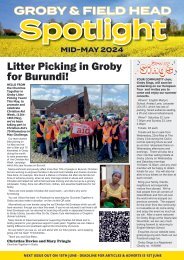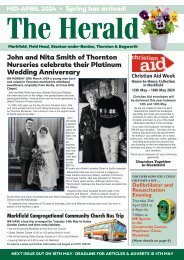MAY 2024 HERALD online
The Herald is a free, monthly village magazine delivered to 4,000 homes and businesses in Markfield, Thornton, Bagworth, Stanton-under-Bardon and Field Head in Leicestershire, UK.
The Herald is a free, monthly village magazine delivered to 4,000 homes and businesses in Markfield, Thornton, Bagworth, Stanton-under-Bardon and Field Head in Leicestershire, UK.
You also want an ePaper? Increase the reach of your titles
YUMPU automatically turns print PDFs into web optimized ePapers that Google loves.
6<br />
THE <strong>HERALD</strong> • MID-<strong>MAY</strong> <strong>2024</strong> • Tel: 01530 244069 • Email: info@markfieldherald.co.uk<br />
Markfield’s Water Famine<br />
“People were having to go about begging for water”<br />
THE OLD NEWSPAPERS inform us that the current day<br />
Markfield residents are lucky that we did not have to<br />
suffer the ‘Adam’s Ale’ situation of the 1920s.<br />
The following words are gathered from the local newspapers, I suspect<br />
Parish Records and other historical records may perhaps tell another story.<br />
For example, in November 1920, the Parish chairman declared that “it was<br />
a sad thing to be without water, but they could not do impossibilities”:..<br />
“The Pump”, there only seems to have been one, was recorded to be on<br />
the Village Green. A fairly good number of the residents, had to rely on this<br />
village pump for their drinking water. There are constant records of :-<br />
“Markfield’s Water Famine – Queues waiting for water and such like,<br />
which have brought this Leicestershire village into a not altogether enviable<br />
prominence”.<br />
“It was a case of racing for water, at times up to three-quarters of a mile to<br />
fill a kettle.”<br />
In an inclusion in the Newark Herald, Markfield is recorded as being<br />
beautifully situated and delightfully picturesque on a Summer’s day, but it<br />
noted that land, housing and water were three great needs and no drinking<br />
water for neatly 20 hours out of 24 was though quite a serious state of<br />
affairs.<br />
Nightly parade to fetch water from Hill Hole<br />
During the water shortages several villagers were fortunate to have their<br />
own wells and such a good spirit prevailed, that those who had water were<br />
invariably prepared within reason, to help their less fortunate neighbours.<br />
In March 1930, the precious village pump was actually out of order for 3<br />
months and there was nightly parade to Hill Hole to obtain water. The mind<br />
boggles. Thank goodness that the many discarded vehicles, now present,<br />
had yet to arrive.<br />
The pump had previously been kept in repair from money received by the<br />
letting of the village green to show people for the annual wakes, but since<br />
the show had been removed to a private ground, there had been no income<br />
for the pump fund.<br />
Having a tap for water was therefore for most an unusual situation.<br />
The water supply was apparently as common to other villages and was<br />
obtained from private wells for the most part, but as Markfield stood in a<br />
very elevated position and in a neighbourhood in which a great deal of<br />
rock abounded, some of the wells were not that successful. The deepening<br />
of some wells was attempted too. In July 1921 when an inspector arrived<br />
in the village, he discovered that the village pump was securely fastened<br />
with a padlock and chain. The well was though found to be 100 feet deep<br />
and contained an excellent supply of water. The pump at that time was<br />
locked up every day until about 4.00 o’clock in the afternoon and was left<br />
unchained until about 9.00 pm in the evening. On Sundays the opening<br />
hours were from 8 to 10 to facilitate with the preparation of Sunday dinner.<br />
It was that desperate. At this time the newspapers reported that 200 people<br />
were dependent on a well for water, assumedly the one on the Green. It<br />
seems people would rather visit a pump, however distant it was, than pay<br />
extra rates for water. Times were hard.<br />
Contractors bored 300 feet through rock<br />
Attempts were continually made to locate water. In 1924 a Mr Kirk<br />
advertised himself as a water diviner “If you want water I can find it”. A<br />
well sinker in 1934 seems to have had a more unusual approach in the<br />
search for water as he with two other quarrymen were in court for stealing<br />
explosives from the quarry. Also, in May of 1934 some contractors boring<br />
300 feet through rock had located a good supply of water which was neither<br />
If you rub a dock leaf on Sting he will disappear.<br />
too hard or soft. They also discovered three sources of water in a field.<br />
They had used patent water & oil detecting apparatus. It probably wasn’t<br />
Mrs Lillingston’s land where they were searching for water, but she kindly<br />
as ever, let the residents of the Council Houses at the top of Ashby Road<br />
get their water from a spring on her land at Ulverscroft, which was two fields<br />
away from them. It was, though, a steep walk all the way back home.<br />
Records appear to be confusing as in 1928 a £2,000 scheme was to<br />
be proceeded with after a unanimous decision to accept it. Confusing<br />
newspaper inclusions appear to suggest that the siting of the new<br />
Sanitorium in the village may have saved the day, much earlier than would<br />
otherwise have been expected. For in May 1930:- “Leicester Corporation<br />
was taking water to Markfield in connection with the new hospital<br />
being erected there. …It would be a distinct advantage if the Leicester<br />
Corporation could take the supply to the village, as the Markfield people<br />
were in a serious position.”<br />
Only 50% of well water samples were good<br />
In May 1928 Markfield was not only having to cope with an ongoing<br />
water shortage, it also had to face the threat of an epidemic of diphtheria.<br />
In March 1928 the school was reported to be filthy, badly heated and<br />
ventilated and that children were kept all day in “a wretched place”. Again,<br />
no proper water supply was noted with men recorded as carrying water<br />
from the village pump. The quality of the village water was of course of<br />
prime importance too. In 1934 eleven samples of Markfield well water were<br />
tested of which - 5 were good, two suspicious and four bad.<br />
Water shortages must of course have been assisted by extremely<br />
inclement weather. In August 1934 for example a terrific rainstorm arrived<br />
in the village. It was so fierce that screen wipers were rendered useless,<br />
driving wind penetrated cars, one car had its windscreen cracked, sewers<br />
were clogged with water and manhole covers were blown off with water<br />
being shot up in the air forming huge fountains on the main road.<br />
Water was not just needed for drinking. In January 1931 a bus caught fire<br />
on Nanpanton Hill on route to Markfield. Passengers were forced to leave<br />
their shopping and scramble out of the rear door. The firemen were unable<br />
to subdue flames due to lack of water and the chemical fire extinguishers<br />
had absolutely no effect. Balloon tyres burst and the bus was reduced to a<br />
mass of cylinders. Blazing petrol lit up the countryside.<br />
In 1934 A farmer was in trouble for adulterating his milk with water.<br />
Formerly, in May 1930 the men of the village, defined then mostly as<br />
miners, had a much better idea of dealing with water shortages. If they<br />
couldn’t get water they would drink beer instead as it was easier to obtain.<br />
So when you go to a sink or switch on the dish washer or washing<br />
machine, try to forget the financial cost and realise how fortunate you are.<br />
And every time you pass the lower Green in Markfield, think of the well<br />
that was once the source of life for so many villagers.<br />
Di Lockley<br />
“It would be a distinct advantage<br />
if the Leicester Corporation could<br />
take the supply to the village, as<br />
the Markfield people were in a<br />
serious position.” (Report in May 1930.)<br />
Contacting an old friend can be nerve-wracking<br />
HAVE YOU been wondering<br />
about an old friend with<br />
whom you have lost<br />
contact? Do you feel a bit<br />
hesitant about contacting<br />
them again?<br />
You are not alone. It seems that<br />
rekindling an old friendship can be<br />
as nerve-wracking as speaking to a<br />
stranger, according to the findings<br />
of a recent study by the University<br />
of Sussex.<br />
The study found that although nine<br />
in ten of us have lost touch with an<br />
old friend, and although we would<br />
greatly welcome a message from<br />
them, we personally feel nervous<br />
about making the first move.<br />
The most common reasons are<br />
fear that the old friend might not<br />
want to hear from us, that it would<br />
be ‘too awkward after all this time’,<br />
and that we feel guilty that we had<br />
not been in touch before.<br />
But Dr Gillian Sandstrom, a<br />
psychologist and Director of the<br />
Sussex Centre for Research on<br />
Kindness, said that the people who<br />
pushed past their hesitation and did<br />
reach out to an old friend reported<br />
feeling happier.<br />
She said that past research<br />
suggests that old friends appreciate<br />
you reaching out, even more than<br />
you expect.
















